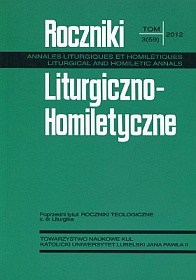Day and Time of Preaching—Historical View
Abstract
The day and time of preaching in Church were set by biblical, pastoral, economic and political reasons. The privileged day for preaching has always been Sunday—the day on which Jesus Christ was resurrected and sent on the Apostles the Holy Spirit. Except for Sunday, sermons should be also given on important Church holidays, especially connected with the lives of Christ, the God’s Mother and some saints. For many centuries the holy Sunday mass could be celebrated between 9 and 13 as that was the time of Christ’s pain on the cross and His death. Then, the word of God was preached which emphasized that great salutary work. Social and economic changes, Church persecution and the II World War were the reasons why holy masses could take place also in the evenings and then sermons were given as well. Finally, the pastoral reasons made the present Church, along with the development of tourism and mobility, celebrate the holy mass in the evening on the day preceding Sundays and holidays. Taking part in the such a mass meets the requirement to participate in the holy mass obligatory for every believer. The celebrant, however, is obliged to give a homily.
References
Lewandowski T.: Odnowa kaznodziejstwa polskiego w twórczości homiletów włocław-skich XX wieku. Od teorii wymowy kościelnej do teologii kaznodziejstwa. Toruń 2011.
Longère J.: La prédication médiévale. Paris 1983.
Panuś K.: Fenomen kaznodziejstwa miejskiego. „Terminus” 1-2:2009 s. 113-130.
Preacher, sermon and audience in the Middle Ages. Ed. C. Muessing. Leiden–Boston–Köln 2002.
Schneyer J.B.: Geschichte der katholischen Predigt. Freiburg 1969.
Schütz W.: Geschichte der christlichen Predigt. Berlin–New York 1972.
Twardy J.: Aktualizacja słowa Bożego w kaznodziejstwie. Przemyśl 2009.
Zink M. : La prédication en langue romane avant 1300. Paris 1975.

